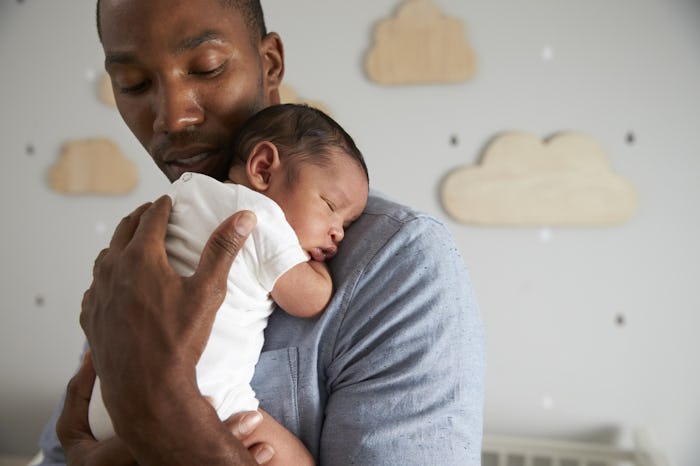Life

Here's What You *Actually* Need To Know About Your Newborn's Nap Schedule
With the onset of new parenthood comes a sudden fascination with numbers. How many dirty diapers per day? How many minutes breastfeeding? How many ounces of the bottle? How many times will you change their clothes each day? (Hint: A lot.) It's no wonder that in addition to the constant back and forth between elation and being completely overwhelmed, new parents are freaking exhausted. Of course, some of that has to do with a baby who is learning to sleep, but experts say it's not the time to worry about "How many naps should a newborn take each day?"
"Newborn sleep is unpredictable," Texas-based Dr. Eboni Hollier, who is board-certified in both general and developmental and behavioral pediatrics, tells Romper in an email interview. "All babies are different and may sleep more or less than average, but most newborns sleep between 12 to 18 per day and sometimes even up to 20 hours per day. However, it does not always feel like it!"
Hollier explains that while it's easy to assume a sleeping baby might mean you can get things done or take a quick nap, newborn sleep is scattered throughout the day and night, making it difficult to pinpoint windows of time for yourself.
"Most newborns sleep between a few minutes and a few hours at a time throughout the day and night," she says. "Newborn sleep does not typically follow a specific pattern and therefore, at this age, parents should not expect their baby to have a set nap pattern."
According to Baby Center, most newborns will sleep for two to four hours at a time, day and night. Like Hollier, the website noted that you shouldn't expect to schedule naps, instead letting "your baby sleep as much as she needs to." Around the 3 to 4-month mark, you can start to expect a little more nap predictability, which is when you can also begin to implement a schedule.
Don't be surprised if you also notice that your baby looks kind of restless when they are sleeping, according to Parents. Your little one still hasn't learned how to control their reflexes, so it's not uncommon for them to twitch their arms and legs, or even smile when they are sleeping.
Of course, smiling when you are sleeping — or sleeping at all — sounds like a dream for many new parents who are simply learning to adjust to the lack of shut-eye that usually comes with a newborn. Dr. William C. Dement, a physician and sleep specialist, told Health Day that new parents lose about two hours of sleep per night for the first five months after bringing home their baby. Do the math on that and it means you're losing about a month of sleep in the first year after their baby is born.
This is where I have to step in and say: Please ask for help. Please, in whatever way that looks like to you, whether it is napping instead of doing the dishes (and your partner does them later) or coming home from work and taking a bath. Ask friends, neighbors, and family members you trust to give you a small window of time while they take care of your little one. Especially during the early days of motherhood, there is a pressure to be everything to your child, but that's impossible. It won't be easy at first and you may feel a little mom guilt, but do it. You will feel better for taking the time and everyone around you will appreciate a more rested you, too.
Because while sleepless nights, mood swings, and un-showered days are inevitable, a little bit of alleviation from mom duties can go a long way when you're up for 2 a.m. feedings and dealing with your third diaper blowout of the day. Promise.
Check out Romper's new video series, Romper's Doula Diaries:
Check out the entire Romper's Doula Diaries series and other videos on Facebook and the Bustle app across Apple TV, Roku, and Amazon Fire TV.